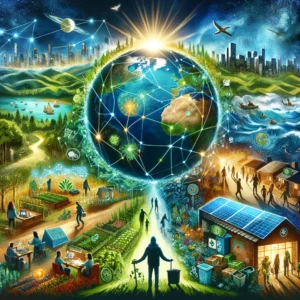Empowering Local Actions for Global Impact
 In today’s interconnected world, the call toward thinking globally while acting locally has never been more crucial. This ethos underpins the very foundation of sustainable development, where individuals and communities recognize their part in the global tapestry and take deliberate, impactful actions in their local environments. The challenges we face—climate change, inequality, and resource depletion—are universal, yet their solutions can often be tailored through local initiatives. By cultivating a global mindset, we become aware of the larger implications of our actions and how they reverberate across the world.
In today’s interconnected world, the call toward thinking globally while acting locally has never been more crucial. This ethos underpins the very foundation of sustainable development, where individuals and communities recognize their part in the global tapestry and take deliberate, impactful actions in their local environments. The challenges we face—climate change, inequality, and resource depletion—are universal, yet their solutions can often be tailored through local initiatives. By cultivating a global mindset, we become aware of the larger implications of our actions and how they reverberate across the world.
Embracing this philosophy, communities around the globe are harnessing local resources and knowledge to create sustainable outcomes that benefit both their immediate environment and the global community. For example, local farmers using sustainable agriculture practices not only contribute to food security in their region but also combat the global issue of environmental degradation. These practices minimize water usage, reduce dependence on chemical pesticides and fertilizers, and increase biodiversity, which are vital steps toward a healthier planet.
Ultimately, thinking globally and acting locally empowers individuals to contribute to global challenges effectively. It fosters a sense of responsibility and connection, urging people to consider the broader impact of their lifestyle choices. This approach not only addresses specific local needs but also contributes to the global mission of creating a sustainable and equitable world for future generations. It’s a powerful reminder that each small, local action can lead to significant global change, making the ethos of thinking globally and acting locally a guiding principle for all who seek to make a difference in the world.
Empowering Local Communities: Tailored Initiatives for Sustainable Impact
- Community Gardens: Promote sustainable living and food security by supporting or creating community gardens in local neighborhoods.
- Local Clean-Up Initiatives: Organize clean-up events in local parks, beaches, or community spaces to encourage environmental stewardship.
- Youth Environmental Education: Offer workshops or programs in local schools or community centers to educate youth on environmental conservation and sustainable practices.
- Local Health and Wellness Programs: Provide community-based health and wellness workshops focusing on holistic well-being, nutrition, and mental health.
- Community Skill-Building Workshops: Host workshops on practical skills such as sustainable gardening, renewable energy installation, or water conservation techniques.
- Local Cultural Preservation Projects: Support initiatives that preserve and celebrate the cultural heritage and diversity of local communities.
- Neighborhood Peace Circles: Facilitate peace-building and conflict resolution sessions in community centers to promote harmony and understanding among residents.
- Technology Access and Training: Provide access to technology and training for underserved communities, focusing on skills that support sustainable development and innovation.
- Local Social Entrepreneurship Incubators: Establish incubators or support networks for local social entrepreneurs working on solutions to community challenges.
- Wildlife and Habitat Conservation: Partner with local conservation groups to protect and restore natural habitats and support native wildlife in the area.